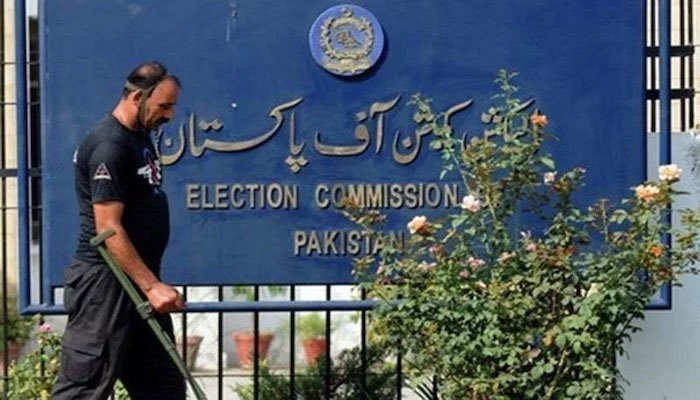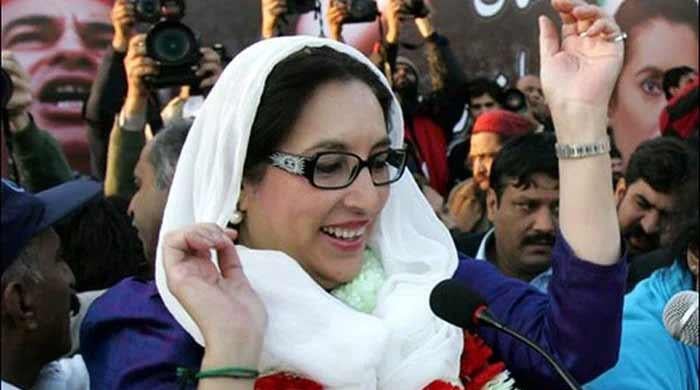ECP informs President Arif Alvi election should be held in October
ECP says it cannot hold elections within three months as the delimitation of constituencies has not been completed
April 07, 2022

- ECP informs President Arif Alvi that it cannot hold elections within three months as delimitation of constituencies was not completed.
- ECP says it had asked govt multiple times to publish the census results.
- ECP says delimitation of constituencies was to be done on that basis but was halted after govt announced conducting fresh census.
ISLAMABAD: The Election Commission of Pakistan (ECP) informed President Arif Alvi on Thursday that it cannot hold the next general elections within three months and suggested that the process be held in October as the delimitation of constituencies was not completed.
In a letter, the ECP informed President Alvi that it is entrusted with holding elections “honestly, justly and fairly”.
The body also informed the president that the “delimitation of constituencies is one of the foundational steps towards election”.
“According to Article 51(5) of the Constitution and Section 17 of Elections Act, 2017, delimitation of constituencies is conducted on the basis of population in accordance with the last census officially published,” said the ECP.
The body said that the “provisional results of 6th national census 2017” were published on January 3, 2018, and it was authorised to carry out “delimitation of national and provincial assemblies” on the provisional results “one-time” via the amendment made under Article 51(5) of the Constitution.
The ECP stated that the final publication of the official results of the census was a “constitutional requirement for delimitation of constituencies” for the next general elections.
The president was also informed that the ECP had taken up the matter with the Imran Khan-led government multiple times via letters to the Ministry of Law and Justice, Ministry of Parliamentary Affairs, Pakistan Bureau of Statistics, and secretaries of the Senate and National Assembly since 2020.
The ECP further explained that under the 25th amendment, seats allocated to the former federally-administrated tribal areas were merged with Khyber Pakhtunkhwa.
“12 seats allocated to FATA were abolished and six seats were allocated to KP on the basis of population. Resultantly, the number of seats in the National Assembly was reduced to 266 from 272. For this reason, fresh delimitation was not possible due to the non-publication of official census results by the Pakistan Bureau of Statistics,” said the ECP.
The ECP said that the Council of Common Interests published the sixth census results after which it started the delimitation process and “approved timelines for delimitation of constituencies for national and provincial assemblies”.
The ECP said that it had to halt the process after the government had announced holding a fresh digital census.
“Subsequently, letters dated 30-09-2021 and 21-01-2022 (Annexures C-I-C-H) were written to the Ministry of Parliamentary Affairs for finalisation and publication of fresh digital census results by the end of the year 2022 so that the process of delimitation could be initiated and completed well within time as the digital census was planned to be completed by March 2023. However, the election commission did not receive any response from the concerned ministry, thereby further delaying the process of delimitation,” said the ECP.
The electoral body reminded President Alivi that it was “not the sole authority to make decisions with regards to the conduct of elections," adding that it “remains dependent” on the federal and provincial governments.
“…for the required feedback in case of any inaction or delay on the part of any government to perform its duties and to assist the commission, the delay in the conduct of delimitation cannot be attributed to the commission by any stretch of the imagination," said the ECP.
“The Election Commission though fully committed to holding elections, would however require at least four additional months to complete the exercise of delimitation. Elections could safely be held honestly justly fairly as ordained in Article 18(3) of the constitution in October 2022,” said the ECP.
To further deliberate the issue, the ECP has also requested President Alvi to hold a meeting.
Fawad asks ECP to review its decision
Reacting to the letter, PTI leader and former information minister Fawad Chaudhry appealed to the ECP to review the decision since it "violates the Constitution."
“ECP should review its decision. Trying to hold elections after 90 days would be a serious violation of the Constitution,” said Fawad.
The former information minister stated that the economy cannot stand “seven months of political chaos”, adding that Pakistan “cannot be allowed to become Sri Lanka”.
“Elections are required within 90 days for bringing political stability to the country at the earliest,” the ex-minister said.
‘Article 254 allows holding polls in 7 months instead of 90 days’
Former ECP secretary Kunwar Dilshad said that Article 254 allows holding elections in seven months instead of 90 days.
Dilshad said that the ECP had written 20 letters to the government but it got no response.
“If elections are held in the National Assembly, then what will be the jurisdiction of the interim government?” asked Dilshad. He added that if the Supreme Court restores the assembly to its April 3 position, then elections will be held on time.
“It is better if the elections and electoral reforms are held on time,” said Dilshad.
CCI approves official release of Census-2017 data
In April 2021, the federal government approved the official release of the Census-2017 results which had been withheld for the last couple of years, Federal Minister for Planning, Development, and Special Initiatives Asad Umar had confirmed back then.
The decision was taken during a virtual meeting of the Council of Common Interests (CCI) — a body that resolves the disputes of power-sharing between the federation and provinces — with Prime Minister Imran Khan in the chair.
Following the meeting, minister Asad Umar held a press conference and said the majority of the provinces have agreed to accept the results of Census 2017 and officially publish them.
"Since elections are held on the basis of the census, we will begin preparations for the next census in September or October this year," Asad Umar said, adding that work on the basic structure of carrying out the census will be completed within six to eight weeks.
"We will complete the new census by March 23," Asad Umar announced. "The government will also form constituencies on the basis of the new census data before the general elections of 2023."
He added that for the upcoming census — which will take 18 months to complete — the government will use technology as well as the principles related to the census laid out by the United Nations.
Pakistan's first-ever digitised population census to be completed in August 2022
However, in August 2022, Umar announced that Pakistan's first-ever digitised population census will be completed over a 30-day period in August 2022 on an "as is, where is" basis and without the requirement of having computerised National Identity Cards (CNICs).
He said this during the inauguration of the National Census Coordination Center (N3C).
The Ministry of Information Technology and the National Telecommunications Center would keep data safe from hackers, and it would not be done over the internet. The process will be monitored through geo-fencing and GIS mapping, Asad Umar said while briefing reporters on the occasion of inaugurating N3C at the Pakistan Bureau of Statistics (PBS) on Tuesday.
Everyone will be counted based on where they have lived in the last six months. To a question about the complexities of the census due to interprovincial movements, particularly in Karachi, Umar said people will be counted on the basis of their existing location in the last six months.









